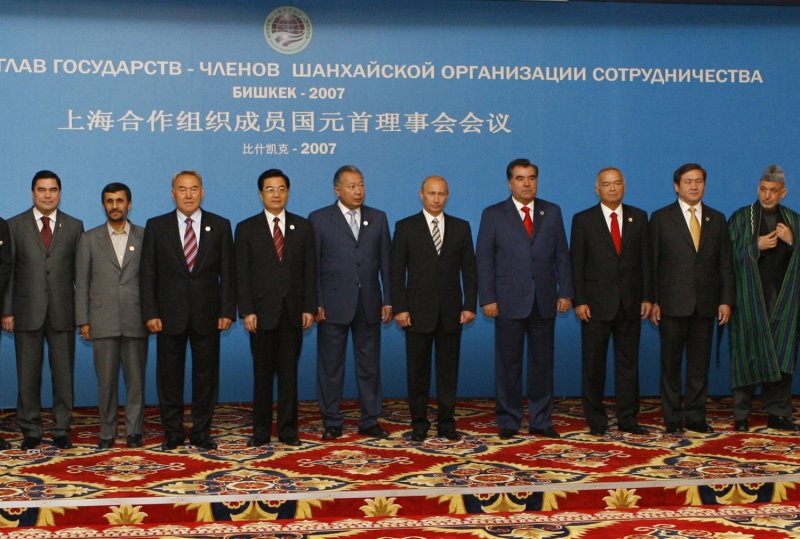(L-R) Turkmen President Gurbanguli Berdymukhamedov, Iranian President Mahmoud Ahmadinejad, Kazakh President Nursultan Nazarbayev, Chinese President Hu Jintao, Kyrgyz President Kurmanbek Bakiyev, Russian President Vladimir Putin, Tajik President Emoamli Rakhmon, Uzbek President Islam Karimov, Mongolian President Nambaryn Enkhbayar and Afghan President Khamid Karzai pose for a group photo as they gather for the Shanghai Cooperation Organization Summit in Bishkek on August 16, 2007. The leaders of Russia, China and four ex-Soviet Central Asian states said on Thursday energy cooperation was the key to the security in their resource-rich region, which they intend to uphold through common instruments. (UPI Photo/Anatoli Zhdanov) |
License Photo
WASHINGTON, April 28 (UPI) -- Of all the post-Soviet Caspian nations, Western investors since 1991 looked most longingly at Turkmenistan, which was essentially unavailable during the reign of Saparmurat Niyazov.
When Niyazov died in December 2006, his successor, Gurbanguly Berdymukhamedov, was courted by foreign energy companies. Sixteen months after Niyazov's passing, their entreaties are starting to bear fruit.
Niyazov treated Turkmenistan's oil and gas industry as his personal fiefdom, and after he died Turkmen opposition groups in exile began to press European banks to recover some of the estimated $3.6 billion that he is believed to have stashed away. So confident is the new administration of foreign investment that it has no need of graft on such a grand scale; Bayrammurad Muradov, executive director of Turkmenistan's Presidential Administration State Agency for Management and Utilization of Hydrocarbon Resources, said that in 2008 the country expects foreign investment in the oil and gas sector to reach $2.5 billion.
Muradov had reason for optimism; Turkmenistan's government estimates its onshore hydrocarbon reserves to be 21 billion tons of oil and 25 trillion cubic meters of natural gas. Even better, Turkmen Caspian offshore reserves are estimated to be 12 billion tons of oil and 5 trillion cubic meters of gas.
The fact Muradov made his upbeat predictions in Azerbaijan was hardly coincidental, as he was attending the second Caspian Oil and Gas, Trade and Transport Conference, sponsored by Britain's Confidence Energy Ltd. and the State Oil Academy of Azerbaijan. The previous week saw Muradov and his colleagues in Britain at the London Institute of Directors' Turkmenistan Oil and Gas conference.
There exist only two small problems for Ashgabat's would-be oligarchs -- the decrepit nature of Turkmenistan's energy industry and the country's geographic isolation.
Turkmenistan's energy infrastructure has suffered from decades of benign neglect, and increasing production will require billions of dollars in near-term investments. While Turkmenistan exports nearly all its natural gas to Russia via Gazprom's Central Asia-Center 1, 2, 4 and 5 pipelines, with a smaller amount going to Iran, and has agreed to build a pipeline to China, Western energy companies are promoting Nabucco, undersea Trans-Caspian projects and even a Trans-Afghan Pipeline.
European investors are most eager to see Turkmenistan buy into the proposed 1,800-mile, westward-bound Nabucco pipeline. The line remains a project in search of both investors and volumes of hydrocarbons to fill it; if built, Nabucco would be Europe's longest and costliest, causing sticker shock with a final price estimated at more than $7.9 billion. Unfortunately, the TAP pipeline faces the small problem of the persistent Taliban insurgency, a problem aided and abetted years ago in no small measure by Niyazov, Kabul's major trading partner during the Taliban's years in power.
But the Afghan insurgency blocks Turkmen exports to Pakistan and India. With a combined population of 1.3 billion, the Indian subcontinent represents Turkmenistan's most lucrative potential market, and Berdymukhamedov's government may be preparing to abandon a decade-old precept of the country's foreign policy to reach it. Under Niyazov, one of the most cherished tenets of Turkmenistan's foreign relations was its policy of neutrality. Perhaps the most startling change in Turkmenistan's foreign policy came April 22, when Turkmenistan newspaper Neitral'nyi reported Berdymukhamedov met with the visiting president of the U.N. General Assembly, Srgjan Kerim, and requested that the United Nations adopt a new convention guaranteeing pipeline security, noting, "Turkmenistan is launching active discussions on a U.N. convention on international pipeline security."
The proposal represents abandonment of a fiercely nationalist policy persistently pursued by Niyazov, who, despite the Kremlin's blandishments, never permitted either U.S. or Russian military bases, though, in the aftermath of Sept. 11, he did permit the Pentagon to conduct humanitarian overflight missions to peacekeeping forces in Afghanistan. Needless to say, if the United Nations passed such a pipeline security resolution, U.N. forces would be posted to volatile regions to protect hydrocarbon assets, no doubt along the largely porous 500-mile Turkmen-Afghan border. Conversely, Turkmen exports northward through Gazprom's networks, eastward toward China or westward under or around the Caspian, pose little such risk.
In the end, the pipeline euphoria wafting through Ashgabat will come down to who makes the best offer. In a world of record high and still rising energy prices, investors eager to secure a slice of Turkmenistan's energy riches are doubtlessly fattening their proposals daily. Interested analysts will be watching to see if greed trumps neutrality -- in any case, market forces are slowly nudging Turkmenistan into the international community, leaving Niyazov's isolated Stalinist state gripped by a cult of personality more behind with each passing day.
The question yet to be answered is who will benefit from a massive influx of hydrocarbon revenue. The U.S. State Department estimates the Turkmen minimum wage to be $40-$60 per month; as their country looks to become the Caspian's new El Dorado, doubtless many Turkmen are wondering if the energy riches will have a trickle-down effect or whether the national economy will continue to resemble their parched nation, which is more than 90 percent desert. The near-term decisions made by the regime will eventually determine whether U.N. troops will protect pipelines or an affluent government from its impoverished citizenry.















